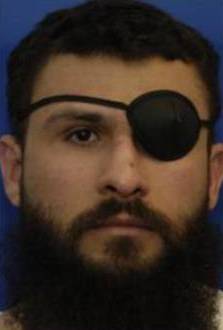
Abu Zubaydah is a Palestinian citizen and alleged terrorist born in Saudi Arabia currently held by the U.S. in the Guantanamo Bay detention camp in Cuba. He is held under the authority of Authorization for Use of Military Force Against Terrorists (AUMF).
Ibn al-Shaykh al-Libi was a Libyan national captured in Afghanistan in November 2001 after the fall of the Taliban; he was interrogated by American and Egyptian forces. The information he gave under torture to Egyptian authorities was cited by the George W. Bush administration in the months preceding its 2003 invasion of Iraq as evidence of a connection between Saddam Hussein and al-Qaeda. That information was frequently repeated by members of the Bush administration, although reports from both the Central Intelligence Agency (CIA) and the Defense Intelligence Agency (DIA) strongly questioned its credibility, suggesting that al-Libi was "intentionally misleading" interrogators.

Khalid Sheikh Mohammed, often known by his initials KSM, is a Pakistani terrorist, mechanical engineer and the former Head of Propaganda for the pan-Islamist militant group al-Qaeda. He is currently held by the United States at the Guantanamo Bay detention camp under terrorism-related charges. He was named as "the principal architect of the 9/11 attacks" in the 2004 9/11 Commission Report.

Waterboarding is a form of torture in which water is poured over a cloth covering the face and breathing passages of an immobilized captive, causing the person to experience the sensation of drowning. In the most common method of waterboarding, the captive's face is covered with cloth or some other thin material and immobilized on their back at an incline of 10 to 20 degrees. Torturers pour water onto the face over the breathing passages, causing an almost immediate gag reflex and creating a drowning sensation for the captive. Normally, water is poured intermittently to prevent death; however, if the water is poured uninterruptedly it will lead to death by asphyxia. Waterboarding can cause extreme pain, damage to lungs, brain damage from oxygen deprivation, other physical injuries including broken bones due to struggling against restraints, and lasting psychological damage. Adverse physical effects can last for months, and psychological effects for years. The term "water board torture" appeared in press reports as early as 1976.
Extrajudicial prisoners of the United States, in the context of the early twenty-first century War on Terrorism, refers to foreign nationals the United States detains outside of the legal process required within United States legal jurisdiction. In this context, the U.S. government is maintaining torture centers, called black sites, operated by both known and secret intelligence agencies. Such black sites were later confirmed by reports from journalists, investigations, and from men who had been imprisoned and tortured there, and later released after being tortured until the CIA was comfortable they had done nothing wrong, and had nothing to hide.
"Enhanced interrogation techniques" or "enhanced interrogation" was a program of systematic torture of detainees by the Central Intelligence Agency (CIA), the Defense Intelligence Agency (DIA) and various components of the U.S. Armed Forces at remote sites around the world—including Abu Ghraib, Bagram, Bucharest, and Guantanamo Bay—authorized by officials of the George W. Bush administration. Methods used included beating, binding in contorted stress positions, hooding, subjection to deafening noise, sleep disruption, sleep deprivation to the point of hallucination, deprivation of food, drink, and medical care for wounds, as well as waterboarding, walling, sexual humiliation, rape, sexual assault, subjection to extreme heat or extreme cold, and confinement in small coffin-like boxes. A Guantanamo inmate's drawings of some of these tortures, to which he himself was subjected, were published in The New York Times. Some of these techniques fall under the category known as "white room torture". Several detainees endured medically unnecessary "rectal rehydration", "rectal fluid resuscitation", and "rectal feeding". In addition to brutalizing detainees, there were threats to their families such as threats to harm children, and threats to sexually abuse or to cut the throat of detainees' mothers.
The CIA interrogation videotapes destruction occurred on November 9, 2005. The videotapes were made by the United States Central Intelligence Agency (CIA) during interrogations of al-Qaeda suspects Abu Zubaydah and Abd al-Rahim al-Nashiri in 2002 at a CIA black site prison in Thailand. Ninety tapes were made of Zubaydah and two of al-Nashiri. Twelve tapes depict interrogations using "enhanced interrogation techniques", a euphemism for torture. The tapes and their destruction became public knowledge in December 2007. A criminal investigation by a Department of Justice special prosecutor, John Durham, decided in 2010 to not file any criminal charges related to destroying the videotapes.
Deuce Martinez is an American intelligence professional. "Deuce" is not his given first name, but a nickname that was used in the first newspaper article naming him. He was involved at the start of the Central Intelligence Agency's Rendition, Detention and Interrogation program of "high-value detainees," including Abu Zubaydah, Ramzi bin al-Shibh, Abd al-Rahim al-Nashiri, and Khalid Sheikh Mohammed.

Ali H. Soufan is a Lebanese-American former FBI agent who was involved in a number of high-profile anti-terrorism cases both in the United States and around the world. A 2006 New Yorker article described Soufan as coming closer than anyone to preventing the September 11 attacks and implied that he would have succeeded had the CIA been willing to share information with him. He resigned from the FBI in 2005 after publicly chastising the CIA for not sharing intelligence with him which could have prevented the attacks.

The Sam Adams Award is given annually since 2002 to an intelligence professional who has taken a stand for integrity and ethics. The award is granted by the Sam Adams Associates for Integrity in Intelligence, a group of retired CIA officers. It is named after Samuel A. Adams, a CIA whistleblower during the Vietnam War, and takes the physical form of a "corner-brightener candlestick".
Noor al-Deen is a citizen of Syria wounded when he was captured by counter-terrorism officials at a raid on a "Faisalabad safe house" when Abu Zubaydah was captured. According to the Washington Post Noor al-Deen, like Abu Zubaydah, was sent to Morocco by the CIA, so he too could be subjected to "enhanced interrogation techniques"

Abu Zubaydah is a Saudi citizen who helped manage the Khalden training camp in Afghanistan. Captured in Pakistan on March 28, 2002, he has since been held by the United States as an enemy combatant. Beginning in August 2002, Abu Zubaydah was the first prisoner to undergo enhanced interrogation techniques. There is disagreement among government sources as to how effective these techniques were; some officials contend that Abu Zubaydah gave his most valuable information before they were used; CIA lawyer John Rizzo said he gave more material afterward.
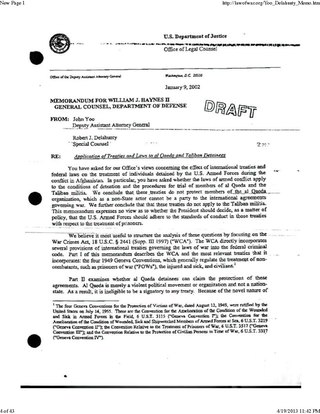
A set of legal memoranda known as the "Torture Memos" were drafted by John Yoo as Deputy Assistant Attorney General of the United States and signed in August 2002 by Assistant Attorney General Jay S. Bybee, head of the Office of Legal Counsel of the United States Department of Justice. They advised the Central Intelligence Agency, the United States Department of Defense, and the president on the use of enhanced interrogation techniques—mental and physical torment and coercion such as prolonged sleep deprivation, binding in stress positions, and waterboarding—and stated that such acts, widely regarded as torture, might be legally permissible under an expansive interpretation of presidential authority during the "War on Terror."
Alfreda Frances Bikowsky is a Central Intelligence Agency (CIA) officer who has headed the Bin Laden Issue Station and the Global Jihad unit. Bikowsky's identity is not publicly acknowledged by the CIA, but was deduced by independent investigative journalists in 2011. In January 2014, the Washington Post named her and tied her to a pre-9/11 intelligence failure and the extraordinary rendition of Khalid El-Masri. The Senate Intelligence Committee report on CIA torture, released in December 2014, showed that Bikowsky was not only a key part of the torture program but also one of its chief apologists, resulting in the media's giving her the moniker "The Unidentified Queen of Torture."
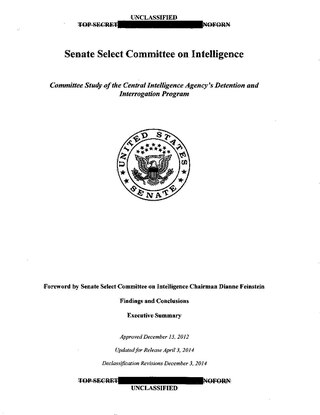
The Committee Study of the Central Intelligence Agency's Detention and Interrogation Program is a report compiled by the bipartisan United States Senate Select Committee on Intelligence (SSCI) about the Central Intelligence Agency (CIA)'s Detention and Interrogation Program and its use of torture during interrogation in U.S. government communiqués on detainees in CIA custody. The report covers CIA activities before, during, and after the "War on Terror." The initial report was approved on December 13, 2012, by a vote of 9–6, with seven Democrats, one independent, and one Republican voting in favor of the report and six Republicans voting in opposition.

Gina Cheri Walker Haspel is an American intelligence officer who was the seventh director of the Central Intelligence Agency (CIA) from May 21, 2018, to January 20, 2021. She was the agency's deputy director from 2017 to 2018 under Mike Pompeo, and became acting director on April 26, 2018, after Pompeo became U.S. secretary of state. She was later nominated and confirmed to the role, making her the first woman to become CIA director on a permanent basis.
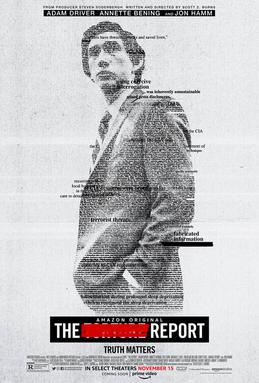
The Report is a 2019 American historical political drama film written and directed by Scott Z. Burns that stars Adam Driver, Annette Bening, Jon Hamm, Ted Levine, Michael C. Hall, Tim Blake Nelson, Corey Stoll, and Maura Tierney. It depicts the efforts of staffer Daniel Jones as he led the Senate Intelligence Committee's investigation of the Central Intelligence Agency's use of torture following the September 11th attacks, covering more than a decade's worth of real-life political intrigue related to the contents, creation, and release of the 6,700-page Senate Intelligence Committee report on CIA torture.
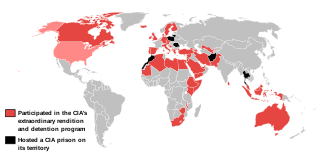
Following the September 11 attacks of 2001 and subsequent War on Terror, the United States Central Intelligence Agency (CIA) established a "Detention and Interrogation Program" that included a network of clandestine extrajudicial detention centers, officially known as "black sites", to detain, interrogate, and often torture suspected enemy combatants, usually with the acquiescence, if not direct collaboration, of the host government.
United States v. Zubaydah, 595 U.S. ___ (2022), was a United States Supreme Court case related to the state secrets privilege. Abu Zubaydah, an alleged Al Qaeda operative, was tortured by two Central Intelligence Agency (CIA) contractors in a black site in Poland. He sought testimony from these contractors in 2017, but the federal government blocked the request, arguing that any information about the black sites was classified. In a 7–2 vote, the Supreme Court ruled against Zubaydah.
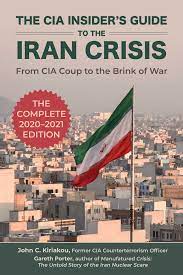
The CIA Insider's Guide to the Iran Crisis: From CIA Coup to the Brink of War is a non-fiction book by former US Central Intelligence Agency (CIA) Officer John Kiriakou and investigative journalist and historian Gareth Porter about America's behavior and actions during four decades with Iran. The book was published by Simon & Schuster publishing on February 4, 2020.












